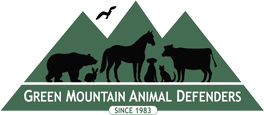
WILDLIFE & REHABILITATION
Green Mountain Animal Defenders strives to educate the public about appropriate human-wildlife interactions. We are deeply appreciative of the many inquiries we receive concerning injured or orphaned wild animals or humane solutions for conflicts with wildlife, and offer the guidance below on responding to emergency wildlife situations and coexisting peacefully with wildlife. Our hope is that the guidance will help to ensure that human-wildlife interactions are safe for all involved.
Sick, Injured, or Orphaned Animals
Finding a wild animal in peril can evoke strong emotions and an urge to take action. However, you may not know what to do. While your compassionate nature may entice you to nurture the animal yourself, this could actually harm the animal and may even be illegal. In Vermont, only licensed wildlife rehabilitators are legally allowed to possess wildlife. If you find a wild animal in danger, contact a wildlife rehabilitator immediately.
Guidance by species can be found at Wildlife Rescue Inc.
Becoming a Wildlife Rehabilitator
Vermont’s wildlife is facing undue hardship due to the lack of enough licensed wildlife rehabilitators in our state. The current rehabilitators are often filled to capacity so the public is left with a heartbreaking dilemma of what to do when they find injured, orphaned or ill animals and there is no place to bring them for medical care and rehabilitation. These animals often languish in fear and/or pain before they perish.
There is a desperate need for more rehabilitators to be trained and licensed! We’d like to help turn that around by encouraging you to consider becoming a licensed rehabber.
Wildlife rehabilitation is very rewarding and it may also be challenging due to the amount of time and expense that may be required. With that said, there is a wonderful community of wildlife rehabilitators who are very supportive of one another’s efforts. Some may even be able to guide you along during the process.
In addition, Green Mountain Animal Defenders may be able to help you financially by reimbursing you for some of your supplies such as cages, medical supplies, food and bedding.
The state's program is run by the Vermont Dep't of Fish & Wildlife. You'd need to become licensed by them to become an official wildlife rehabber. You may want to consider finding a licensed rehabilitator you can volunteer with or become an apprentice for. Here is a list of Vermont rehabbers who may need a volunteer or apprentice and/or may be able to answer some questions for you: 2020 Licensed Wildlife Rehabilitators
If you are considering becoming an apprentice or a licensed rehabilitator, here are some great resources:
Wildlife Rehabilitation Is It for You? This booklet from the Wildlife Rehabilitator Recruiting Project provides a general overview.
Wild in Vermont Apprentice Program Package A group of Vermont Information on an apprentice program sponsored by Wild in Vermont rehabilitators.
Wild in Vermont, Inc., an organization which focuses on assisting Vermont’s wildlife rehabilitators.
Wildlife Rehabilitation Apprentice Program: WILD IN VERMONT,INC
You may also be interested in:
National Wildlife Rehabilitation Association (NWRA). They hold an annual three day conference. Join and get the NWRA Principles Manual
New York State Wildlife Rehabilitation Council (NYSWRC) for basic training and conference info
Wildlife Rehabilitation Association of Massachusetts (WRAM) who holds an annual one day seminar at Tufts Wildlife Center in North Grafton, Mass.
Rabies
Raccoons, bats, skunks, and foxes are the primary carriers of rabies in New England. If you find an animal that you think may have rabies, do not approach! Instead contact a licensed "rabies vector" wildlife rehabilitator and or call the Rabies hotline immediately. Or call 1-800-4-RABIES.
Deer
If you hit a deer while driving or see an injured one, contact the State Police and a Vermont Fish and Wildlife Department game warden. The animal may have to be euthanized, but this can be more humane than simply abandoning the animal.
Human-Wildlife Conflicts
There are many humane solutions and useful tips to avoid or resolve problems that may occur when wildlife gets into your home, workplace or garden.
For professional solutions in Vermont, contact HEART Wildlife Removal - Humane Eviction and Removal at (802) 651-6863
Thank you for your interest and compassion!
